Cities of Innovation: Riga
Key indicators
ICT infrastructure
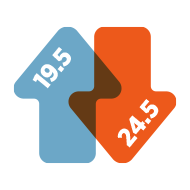
Average broadband speed (Mbps)

Free Wi-Fi points
— Excellent 4G coverage and working on 5G implementation — Users have access to nearly 1000 free Wi-Fi points
Local, national and international transport links

Flight destinations
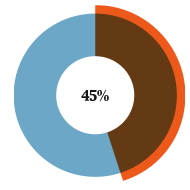
Baltic air passenger traffic (7.1 million passengers in 2018)
— 100 destinations with 7 million passengers, 45% of the entire Baltic air passenger traffic Connections to Moscow, St. Petersburg and Minsk from Riga Railway Passenger Terminal Largest ice-free port for Latvia
University links and access to talent

QS World University ranking (Riga Technical University)
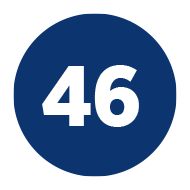
Higher education institutions
— 3 main public universities · The University of Latvia (UL) · Riga Stradiņš University (RSU) · Riga Technical University — 95% of the population speak at least one foreign language
Costs and availability of workspace

Co-working spaces (+ more than 1800 workstations)
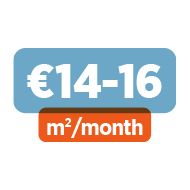
Class A offices average rent
— Vacancy rate for 2017/2018 is 5.59% — Average rent · Class A €14-16 m2/month · Class B1 €10-12 m2/month · Class B2 €7-9 m2/month — The average rent for co-working varies from €75-150 month
City support for start-ups and SMEs
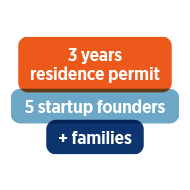
Start-up Visa (Non-EU entrepreneurs)
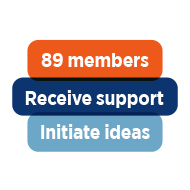
Start(it) platform
— Hackathons include Minsk-Riga Startup Train — Seminars and consultations organised by the Investment and Development Agency of Latvia (LIAA), include Startup Bootcamp — LIAA offices located worldwide
Financial support and access to investors & accelerators
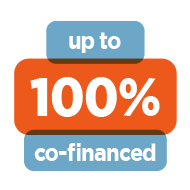
Government innovation vouchers (Maximum €25,000 to cover R&D costs)
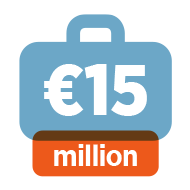
Government funding 2017 (4 acceleration funds)
— 2017 startup law · Low flat social tax · No individual tax for startup employees · 45% co-financing offered by the government for the highly qualified specialists — 4 business incubators & 7 VCs
Additional information
Local, national and international transport links
Riga International Airport is the second fastest growing airport in Europe according to the Airport Council International (ACI) report on airport performance in Europe in the 2nd quarter of 2018. The 20 airlines operating at Riga Airport offer more than 70 destinations in the winter season and 100 in the summer season. In 2017, Riga Airport handled over seven million passengers – 45% of the entire Baltic air passenger traffic.
By bus from Riga International Coach Terminal it is possible to travel to several countries – Estonia, Lithuania, Belarus, Poland, Germany and Russia.
It is also possible to travel from Riga to other cities in Latvia by using local trains or buses.
Riga city centre is easy to navigate – there are trams, trolleybuses and buses. Taxis are plentiful, as are online ride sharing services Bolt and Yandex. Car sharing services provided by CARGURU are also gaining popularity.
In 2018, an electric vehicle charging point network was created and, by 2021, there will be up to 150 charging points around Latvia.
The number of cyclists in Riga is increasing every year, as infrastructure for bike riding is improving.
University links and access to talent
The innovation eco-system consists of universities, other higher education institutions and independent research institutions, and the largest and most prestigious institutions are in Riga.
The University of Latvia (UL) is the largest research university in Latvia. UL has 15,500 students including 747 international students.
Riga Stradinš University (RSU) offers an extensive choice of programmes in health care and the social sciences, and has a strong foundation in research and international recognition. There are 8,800 students including 2,200 international students from 53 countries.
Riga Technical University is the largest technological university in the Baltic States. There are 14,672 students including 2,353 international students.
The largest private higher education institutions are located in Riga, for example RISEBA University College of Business, Arts and Technology, Turiba University, Riga Business School, Stockholm School of Economics in Riga.
Renowned research institutions in Riga include: Latvian Institute of Organic Synthesis, Latvian State Institute of Wood Chemistry, Institute of Solid State Physics, Institute of Electronics And Computer Science.
There is support for the commercialization of research results; the most feasible scientific ideas receive assistance to turn their research into future business. Such projects are developed by public universities or research institutes, and funded by Investment and Development agency of Latvia.
Quality of talent
— 47% of the city’s population have entered higher education.
— 28% have entered vocational education or professional secondary education.
— 54% speak at least two foreign languages.
— 13% speak at least three foreign languages.
— 70% of the population under 40 speaks English.
There are 46 higher education institutions and colleges and 80% of Latvia’s students study in Riga.
Costs and availability of workspace
A- and B-class office space at the end of 2017 totalled 637,150 sqm, out of which 15% was A class offices, 70% B1 class, and 15% B2 class. The vacancy rate for 2017/2018 is 5.59% or 37,474 m2.
The first full-service hotel offices in Riga appeared in 1999, though the name of the concept was coined much later. By the end of 2016 the number of accessible workspaces reached 650 and then doubled by the end of 2017. Currently there are 14 co-working places and more than 1,800 workstations in Riga.
The monthly rent for a designated workstation is 200 EUR, for non designated it is 150 EUR. For 640 EUR a month clients can rent out a separate room. Typically, this price includes internet, shared kitchen, printing facilities, meeting rooms, electricity, reception, cleaning and so on.
The total stock of co-working spaces has doubled over the last two years, and according to Colliers International the number of co-working places in Riga is expected to rise.
City support for start-ups and SMEs
A startup visa is available for foreigners, which essentially grants non-EU entrepreneurs a residence permit if they set up a company in Latvia. Applicants should apply to the OCMA (The Office of Citizenship and Migration Affairs). There is a guide on how to apply for the visa.
One startup can have up to five founders with startup visas. The application process takes one month. The visa is given for a maximum of three years and it is spouse and children friendly.
Hackathons
The Latvian government provides international-level hackathons for different startup verticals. One of the most significant, organised by Magnetic Latvia Startup and the Imaguru Startup Hub, was the Minsk International hackathon which took place on the Minsk-Riga Startup Train. It attracted 10 teams consisting of 60 entrepreneurs, developers, and mentors.
In 2018, the Magnetic Latvia Startup also organised Startup Bootcamp at Riga’s international airport.
Seminars and Consultations
There is a series of free informative seminars designed especially for startup needs and organised by the Latvian Startup Association Startin. LV in cooperation with the Ministry of Economics, Investment and Development Agency of Latvia (LIAA) and other partners. The main goal of the seminars is to educate Latvian- based startups regarding investment opportunities and financial support, as well as advice on legal aspects.
Startin.LV was created in 2016 to unite the Latvian startup community around common values with the aim of developing a better startup ecosystem in Latvia.
Startin.LV is a platform that enables startups to initiate ideas, be heard, and receive support in fulfilling their needs and solving problems.
The LIAA also has representative offices abroad.
Business Incubators
Riga Technical University (RTU) Design Factory is a student incubator that organises various support programmes and teaches idea prototyping using technologies such as laser cutting and engraving, 3D printing and scanning, as well as high-speed CNC machining and post-processing.
The University of Latvia (LU) has also made efforts to promote science-based startups, organising events like the first Deep Science Hackathon and Blockchain Pre- accelerator.
The LU Institute of Solid State Physics has also developed Materize – a new platform for exporting science services and cooperating with industry in the field of high technologies.
Financial support and access to investors & accelerators
Since 2017, Latvia is the first country in the region to have a special law for budding entrepreneurs.
The law defines a startup as an innovative scalable business with high economic potential. It also describes three support mechanisms for early stage startups. In essence: low flat social taxes and no individual taxes for startup employees, as well as 45% co financing offered by the government.
The law also details aid for the activities of start-up companies. Innovation Vouchers are yet another powerful Latvian government support mechanism for any size company to encourage cooperation between research and industry to develop new products and technologies. Up to 100% can be co financed by the government with a maximum support of €25,000 to cover R&D costs such as:
- — Technical and economic feasibility studies.
- — Industrial research.
- — Experimental development.
- — Industrial design.
- — New product/ technology certification and testing.
- — Protection of industrial property rights.
- — Attraction of highly qualified employees.
An initiative called, Support to Explore the Globe, provides co-financing of up to 70% for startup and SME participation in international conferences, exhibitions and business travels. In 2018 the maximum amount of support was €3,800 per startup.
Acceleration Funds
In 2017, the government made a special €15 million acceleration fund available through ALTUM (a state-owned development finance institution), to support Latvia-based early-stage startups. The fund was then equally divided between three professional fund managers who have their own startup focus and acceleration programme in place.
BuildIt Latvia accelerator’s new intensified programme is specifically designed for IoT and hardware startups from all over the world. BuildIt provides investment of up to €50,000 pre-seed, and up to €250,000 at seed stage.
Overkill Ventures – is an acceleration fund that grants pre- seed investments of €40,000 and seed investments of up to €250,000 to new companies from Central and Eastern Europe and the Nordic countries. They focus on B2B software startups using emerging technologies to build solutions that will shape the future of workplaces across industries.
Commercialization Reactor is a notable acceleration initiative that aims to help deep-tech startups with making their inventions commercially viable. This international platform unites scientists, entrepreneurs, mentors and, finally, investors.
The Commercialization Reactor Fund invests up to €50,000 into new companies at pre-seed level and up to €250,000 into the most successful companies at seed level.
Startup Wise Guys is a private B2B accelerator which has been present in Latvia for two years. They boast a 77% post-accelerator success rate. €30,000 pre-seed investments are available plus a possible follow- on investment.
Venture Capital Funds
There are many Venture Capital (VC) funds in the region. VCs will provide a larger investment, usually in return for equity. Often there will be additional support opportunities, which vary depending on the VC.
Some of the most active VCs in Latvia include:
— LatBAN (The Latvian Business Angels Network) and their members
— LVCA (Latvian Private Equity and Venture Capital Association) and their members
— Imprimatur Capital
— Change Ventures
— iTech Capital
— Buran Venture Capital

